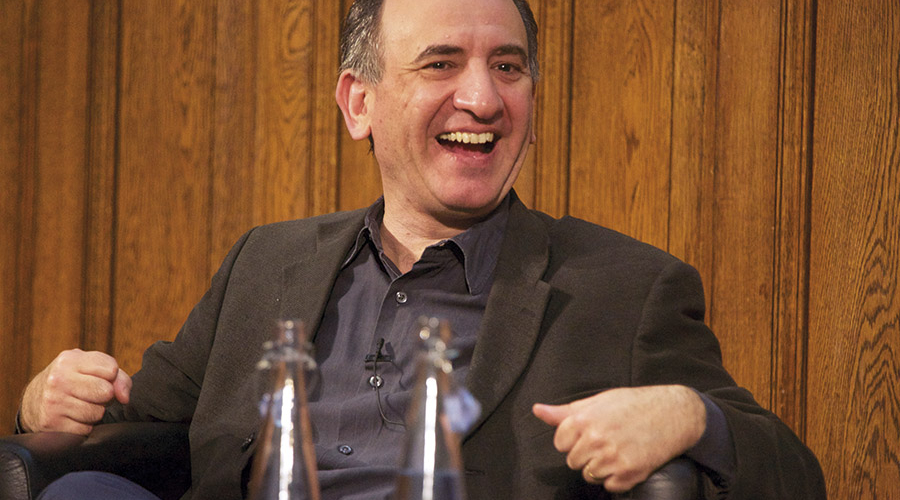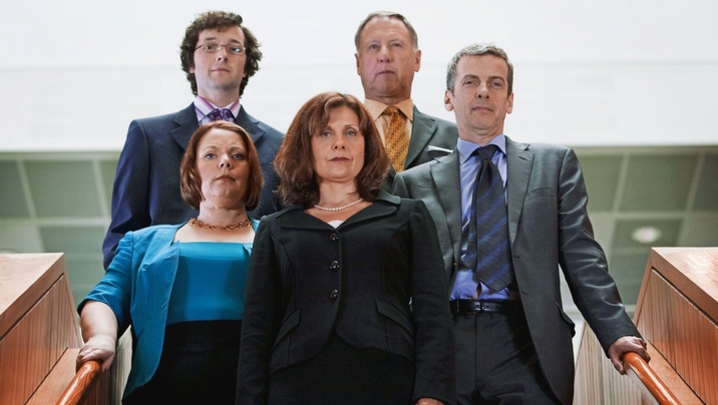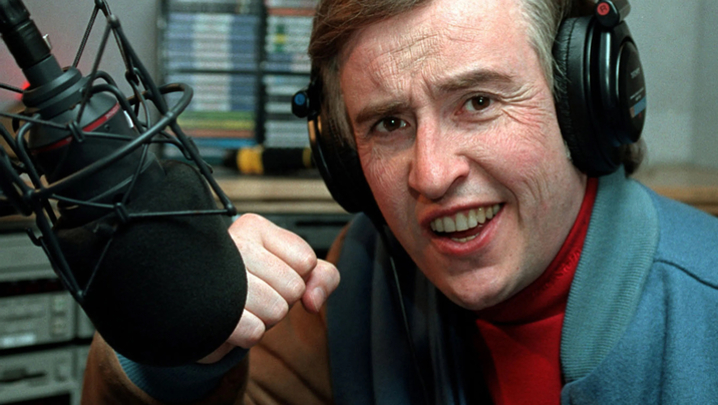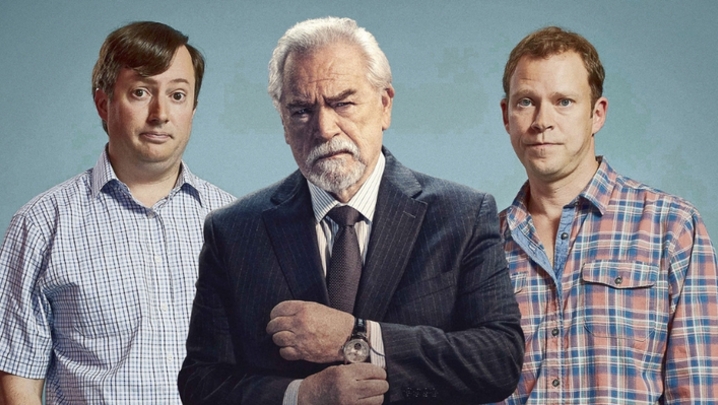Armando Iannucci looks back on more than two decades of TV laughter and reveals his love for Morecambe and Wise. Steve Clarke takes a front row seat
By many people's reckoning, Armando Iannucci is one of our greatest and funniest TV satirists. The political classes and the grammar and conceits of television have proved fertile ground for Iannucci's wit and his team of gifted collaborators, notably Steve Coogan, Rebecca Front and Chris Morris.
Iannucci's remorseless, and occasionally scabarous, humour has sustained a wide-ranging and lengthy career across radio, TV and film. He learned his craft as a radio producer back in the late 1980s. Since then, he's worked as a writer, performer and director, principally for the BBC, but also for Channel 4 and, latterly, for HBO.
The US subscription service, feted for high-end fare such as Game of Thrones, commissioned Iannucci to make Veep, for which Julia Louis-Dreyfus has thrice won an Emmy as a gaffe-prone Washington politician.
Veep is further proof that British humour can work on the other side of the Atlantic and thrive in the world's most competitive TV market.
At a sold-out RTS early-evening event, Iannucci looked back on his life in comedy.
He began by highlighting his comic roots with clips from Morecambe and Wise and Spike Milligan before explaining how he'd helped to sire two of TV's most perfectly realised comic monsters. Step forward, foul-mouthed, New Labour spin doctor Malcolm Tucker, played to manic perfection by Peter Capaldi in The Thick of It, and the hapless, gormless Alan Partridge, an enduring creation that refuses to die.
Iannucci told interviewer Lucy Lumsden, Sky's Head of Comedy, how, as a child, he'd been brought up in Glasgow on a diet of mainstream TV, supplemented by a side order of radio comedy.
"I love comedy that has surprises and has ideas behind it"
The family "was a big Saturday night, BBC One, Morecambe and Wise, Generation Game, Mike Yarwood-watching" household. As a comedian in the making, he failed at first to appreciate Monty Python, preferring instead the eccentricities of The Goodies.
Lumsden asked if he considered himself a satirist. "I've never really seen myself as being political," replied Iannucci. "I've always been fascinated by politics and drawn towards it because I think politics is important...
"I really love slapstick... visual humour... hopefully aligned with verbally dexterous stuff, as well.
"I love comedy that has surprises and has ideas behind it."
One of the things he loved about Eric and Ernie was the double act's ability "to take a normal thing and change one element". To demonstrate his point, Iannucci showed the audience a Morecambe and Wise sketch in which the former struggles hilariously and in vain with a gigantic ventriloquist's dummy.
This love of the surreal was evident also in a clip of Spike Milligan. In the sketch, the comedian does the voiceover for a dalek invading a suburban dining room as the table is being laid.
"You could sort of call it satire, but it's not really," explained Iannucci in remarkably genial tones for someone who is obviously drawn to the darker side of human nature. "It's funny, completely distinctive. Spike Milligan has his own voice and yet takes bits that are familiar cultural iconography...
"The people I really enjoyed were the quirky ones: Ivor Cutler and Spike Milligan, Marty Feldman and The Goodies."
It was after Oxford (where he did a bit of writing and stand-up) and landing a job in the comedy hothouse that was BBC Radio that Iannucci began to find his own voice.
"They talk about corridor culture. It literally was a corridor, with lots of writers coming in and out," said Iannucci. "You'd befriend writers over a cup of tea and suddenly think of an idea."
Having other wordsmiths around allowed Iannucci to raise his game.
"Writing is a displacement activity," he said. "If I sit down on my own to write, I do a 101 things; but if you're in a room with people who're all funny, you're egging each other on.
"Or you push ideas to levels that you wouldn't really do on your own – or you'd take three times the amount of time to get there... There's something about sparking off each other.
"When we write all the Partridge stuff... either Peter [Baynham] or myself will be at the keyboard with Steve wandering around as Alan."
A pivotal moment at BBC Radio was meeting Chris Morris, whom Iannucci had heard parodying DJs on his Saturday morning Greater London Radio show.
At the time, Iannucci was producing programmes such as Just a Minute and Week Ending. The latter was an influential sketch series lampooning politicians and their peccadillos that served as a training ground for comedy writers.
"Chris and I immediately hit it off. We discovered we were both very similar in age, had both gone to Jesuit schools and had had the same teachers despite being educated in different parts of the country," recalled Iannucci. "He had a very, very battered old car that he was trying to park outside Broadcasting House.
"He couldn't find anywhere to park so I just got in. He drove me around Broadcasting House about 200 times and so we had our meeting."
The pair assembled what became the team for the news satire On the Hour. It included the writers Stewart Lee and Richard Herring, and a line-up of acting talent headed by Steve Coogan and Rebecca Front.
As Lumsden noted, unlike a lot of BBC comedy talent, the On the Hour troop was not an Oxbridge clique.
Iannucci explained: "It was a disparate group of people who gelled... We wanted to do a comedy show that didn't sound like any other comedy show.
"The humour had to be different. It had to have a surreal quality and characters, but feel weird and not too scripted, so we encouraged people to improvise. But good gags.
"We made it like a magazine, with lots of different items."
It was here that Alan Partridge was invented – initially, as a gauche sports reporter (see below). On the Hour'ssuccess gave Iannucci the confidence to go freelance and enter the very different and more demanding world of television.
The result was BBC Two's The Day Today, another news spoof, and the comedian's first experience of working in television.
"BBC Television approached us," Iannucci recalled. "But it was very traditional then. They said: 'You're radio producers. You can't deliver it, so we'll give it to someone else.'
"I said, 'No, you can't have it.' This was bizarre because, at the time, a lot of radio comedy was going to TV."
Several independent producers, including comedy specialist Hat Trick, wanted to make the show.
Iannucci and Morris decided to accept TalkbackThames's offer, which turned out to be a smart move.
"Peter Fincham [The Day Today's Executive Producer] said: 'I'm here just to let you get on with it.' That's exactly what he did.
The Thick of IT depends on its poisonous, vitriolic freneticism. But the US version was shot very conventionally
"He was a fantastic mentor because he understood it and knew the best thing to do was to leave us alone. If ever the BBC got in the way, he would reassure them," said Iannucci.
Was it intimidating being in telly, probed Lumsden.
"It was an enormous learning curve," Iannucci confessed, "because we were not just making our own TV show...
"It was a show about television, so we were learning television in order to undo it.
"The BBC was very good. BBC News even arranged for Chris and me to attend a training course in order to learn how to make TV news – so that, basically, we could give it the finger."
In the same year that Iannucci worked on The Day Today, he was also involved in assembling Alan Partridge's first dedicated show, Knowing Me, Knowing You, originally for Radio 4 but later to move to TV.
Meanwhile, BBC Two gave Iannucci his own programmes, including Friday Night Armistice and, later, Time Trumpet.
On the eve of Tony Blair's 1997 landslide victory, Iannucci hosted an election-night special, Election Night Armistice, which ran for more than three hours.
The Thick of It began life as a reinvention of Yes, Minister but ended up breaking new ground – partly because it was made on a shoestring. BBC Four Controller Roly Keating told Iannucci he had £100,000.
Iannucci said he thought: "What can you do with that? I worked out that you could probably do three episodes if we went to one building."
As it turned out, The Thick of It was filmed in three different unused office buildings. Each episode was shot in three days.
"I wanted to make it fast and furious.... with a documentary feel," Iannucci revealed. "I didn't want it to look staged. I wanted a bit of improvisation. It was as if we were eavesdropping on reality."
The constraints helped to enhance the show's intensity. "It gave everyone a little bit of a frenetic look in their eyes as they tried to learn the lines they'd just been given," Iannucci continued.
"Fundamentally, it's a sitcom. It's a farce... What struck me, reading behind the inner workings of the Blair, Mandelson, Campbell thing, [was that] the funny thing was, they kept worrying about stuff.
"If they hadn't worried [so much] about stuff, it would have gone away. But it was the attempts to manage [the news]... to try and haul in a news editor and stop him from doing [something]... It was that, magnified...
"If you actually analyse Malcolm Tucker's record in every episode, it's terrible. He comes in and shouts at people. They're really scared of him.
"He tells them what to do. They do it. And it's a disaster. But he sort of gets away with it because, by then, he's left the building...
"I wanted it to be unsettling, which is why the language is the way it was."
In The Thick of It the actors lead and the cameras follow. Lumsden wanted to know if the same was true of Veep.
"Yes, we didn't put any marks down and there were radio mikes. I said: 'Even if you're not in this shoot, if you speak, we'll hear you. So don't feel you're off.'
"I remember the cast saying that it was exhausting. You can't save all your performance for the close-up: it might not come. It's every take. The camera can suddenly swing around.
"I was always saying to the camera team: 'Don't go to them before they speak. Let them speak and then go and find them, as if you were a documentary team.'"
A key moment in getting Veep off the ground was Iannucci's first encounter with Julia Louis-Dreyfus.
Iannucci said he "was fully expecting an entourage of people and a very polite 20-minute conversation. She just turned up and we chatted over a pot of tea for about three and a half hours, making each other laugh...
"At the end of the meeting, I got on the phone and said, 'Right, we're away.' It was like meeting Chris Morris, driving around Broadcasting House."
Working for HBO reminded him of the BBC a decade or so earlier. The lines of command were flat and he was allowed to get on with making the show.
All the writers, directors and editors on Veep are British. The show is written in the UK, shot in Baltimore and edited in London.
Iannucci said he finds it irritating that a lot of people who work in British TV are in awe of their counterparts in the US. He reminded the RTS audience that the editors and writers working on Veep have won awards in the US.
"It's a source of great pride," he said. "We shouldn't feel embarrassed to be there [in America]... I think the British television industry is world class and the best people in British television can compete with anyone."
'Armando Iannucci in conversation with Lucy Lumsden' was held at the Telford Theatre in central London on 25 March. The producers were Sally Doganis and Terry Marsh.
Iannucci on... Why US does more TV satire
'We forget that the US audience is much, much bigger. The Daily Show only gets a tiny percentage of the big American audience but it's enough to keep it going and give it the advertising that it needs.
'We have a smaller population to play to. I'd say the UK equivalent of The Daily Show is the stuff that Charlie Brooker does.
'It's very difficult here to find the resources to justify something that will play to a niche audience.
'With a bigger market, they can make something work without the obligation to go mass market.'
Iannucci on... The birth of Alan Partridge
'I said to Steve [Coogan]: "Have you got a voice that sounds like a sports reporter? But it's not an impression. It's not David Coleman or John Motson."
'Steve just went [slips into Alan Partridge]: "What, a voice like this?" Instantly, everyone in the room went: "That's him."
'Within seconds, somebody said: "He's called Partridge." And someone else went: "He's an Alan." It's almost like he emerged fully formed.'
Iannucci on... The Thick of It in the US
'I was flown out to Los Angeles and stayed in this nice hotel.
'Nothing happened for two weeks. I was getting a little restless, so they allowed me to attend a meeting.
'It had 30 people in it. It was to discuss the colour of the ties and jackets the cast were going to wear. It was at that point I said, "Take me home."
'The Thick of It depends on its poisonous, vitriolic freneticism. But the US version was shot very conventionally.
'There was no swearing, Ollie was a girl, and I think there was an upbeat, happy ending.
'It wasn't bad, it was boring.'
Iannucci on... Being an outsider
'[In Scotland], there is that thing of being neither in nor out. If you go to a very Scottish occasion, such as a ceilidh, you think it's a bit strange. But if you go to an Italian wedding or your first communion, it's also a bit strange.
'You don't know quite where to fit. You're an Italian in Scotland and a Scot in England. There are these layers of feeling slightly at one remove.'
Iannucci on... Improvising with actors
'Working with a really good actor is like working with a musical instrument...
'I know that if I give Rebecca Front a scenario, she is going to be absolutely amazing...
'The cast of Veep forces you as a writer, as well as a director, to think of new things and play to their strengths.
'I always love it when a performer gives you something you weren't expecting... In the first episode of The Thick of It, the minister says: "Why don't we fire David at Transport?" And Malcolm says, "Fine", and the minister says: "It's only fucking Transport."
'At that point, Malcolm looks at him, the charm suddenly disappears from his face and the eyes start to burn with hate.
'That wasn't in the script. It's just Peter thinking. He didn't say anything for a very long 10 seconds.
'I was watching on the monitors. That's when I thought we're on to something here.
'That's what I like about the collaborative thing... There are people who want to take risks.
'That's why I want to make another film. I love working with great actors.
'They don't have to be famous actors or big names. They just have to be good.'
Iannucci on... What he's watching
'I've been so stuck in the edit for the past four years that I feel a bit behind.
'I like Uncle (BBC Three).
'Mrs Brown's Boys occasionally makes me laugh. I am not anti-Mrs Brown's Boys; I don't watch it regularly.
'I like House of Fools and Toast of London.
'They're all silly and written by quite seasoned writers.'





